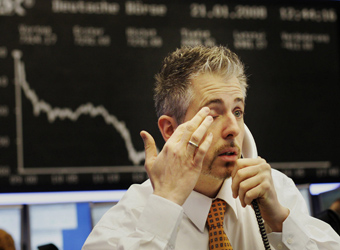European markets closed down on Monday afternoon as investors focused on the potential impact that trade barriers could have on global growth.
The pan-European STOXX 600 ended 0.17 percent lower with most sectors and major bourses in negative territory.
Oil and gas stocks led the losses as oil prices moved lower after increased pressure on the commodity from U.S. drilling activity in an already bloated market. Brent was trading at $51.73 a barrel, down 0.06 percent.
U.S. WTI stood at $48.41 per barrel, 0.8 percent lower.
Britain’s Tullow Oil was trading close to the bottom of the European benchmark after announcing plans last week to raise £607 million ($750 million) in order to reduce a debt burden. Its shares provisionally closed 2.3 percent lower.
Hugo Boss shares dropped 4.7 percent on Monday on news the German clothier had reportedly failed to attract an investment from Belgian investment firm Groupe Bruxelles Lambert.
Unilever is reportedly preparing a £6 billion ($7.44 billion) sale of some of its food brands, according to U.K. newspapers on Saturday. Its shares moved 0.36 percent higher.
Meanwhile, in the U.S. markets were trading mostly higher as money managers digested comments from U.S. Federal Reserve officials that showed some divergence within the central bank regarding rate hikes.
The Nasdaq composite hit a fresh all-time high in mid-morning trade before holding about 0.1 percent higher.
Minneapolis Fed President Neel Kashkari told CNBC on Monday that he voted against a rate hike last week because he wanted to see more inflation in the U.S.
U.K. Prime Minister Theresa May is set to trigger article 50 on March 29, her spokesperson said on Monday. This will start the 2-year countdown to Britain leaving the European Union.
May is also poised to make a Commons statement on the same day.
Sterling rose to a three-week high against the dollar on Monday after the G-20 appeared to buckle under increased pressure from the U.S. administration by omitting what would usually be a typical reference to fighting protectionism.
However, the U.K. currency was relatively unmoved on the Brexit news having rose past $1.24 shortly after the open.
A G-20 meeting of finance ministers over the weekend issued a communique that notably avoided its usual pledge against protectionist policies, just two days after U.S. President Donald Trump hosted a somewhat awkward meeting with German Chancellor Angela Merkel.
Meanwhile, both Merkel and Japanese Prime Minister Shinzo Abe moved to defend free trade over the weekend, in what appeared to be a thinly-veiled response to Trump’s “America first” rhetoric.
Germany’s Social Democrats hosted a convention on Sunday in which the party overwhelmingly confirmed Martin Schulz as the candidate to challenge Merkel in September’s election.
On Monday, France is poised to hold its first televised presidential debate with major candidates expected to discuss a range of issues as April’s first-round vote draws ever closer.
Elsewhere, euro area finance ministers gathered for a Eurogroup meeting in order to discuss developments relating to the second review of Greece’s macroeconomic adjustment plan.
Source: CNBC


